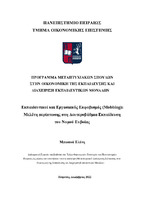Εκπαιδευτικοί και εργασιακός εκφοβισμός (mobbing) : μελέτη περίπτωσης στη δευτεροβάθμια εκπαίδευση του νομού Ευβοίας
Teachers and mobbing : case study in the secondary education of the prefecture of Evia

View/
Keywords
Εργασιακός εκφοβισμός ; Εκπαιδευτικοί ; Σχολική ηγεσία ; Σχολικό κλίμα ; ΘυματοποίησηAbstract
Modern studies have pointed out that teachers belong to a professional group of high risk as far as workplace harassment is concerned. The victims of mobbing have to deal with long term effects, such as psychosocial and physical problems, stress, depression, professional burnout.
The importance of the effects of the phenomenon has motivated the research questioning of the present study whose aim is to examine the phenomenon of workplace harassment in the Secondary Education teachers of Evia. Other research objectives concern the frequency of workplace bullying in the schools of Evia, the display of the management strategies adopted by the teachers and the presentation of the teachers’ opinions concerning the influence of the school climate and leadership, taking into account a series of demographic variables.
The results of the questioning part derive from the elaboration of a quantitative research based on a sample of 199 teachers (129 women and 70 men) in the prefecture of Evia. According to this, the degree to which incidents of mobbing occur in schools is generally low, while any incidents of workplace harassment against teachers appear to be isolated incidents.
In conclusion, the findings of the present research show that the major influencing factors of the appearance of the phenomenon is the school climate and leadership whereas from the individual variables the sex proves to be a determinative variable in contrast to age and the years of previous employment which do not seem to affect the appearance and culmination of the phenomenon to a great extent.
The most important abusive behaviors mentioned by the victims is excessive workload and the fact that their ideas and opinions are ignored, both of which mainly stem from colleagues and in similar but lower percentages from the headmaster, the students and their parents.
Additionally, the most significant strategies of confronting hostile behaviors and harassment have been recorded, which include discussion with other colleagues for support and ideas as well as avoidance or confrontation of the abuser.
The findings of the present study might provide valuable information to related fields of politics configuration so as to reinforce and support teachers to accomplish their duty to school and the society.


